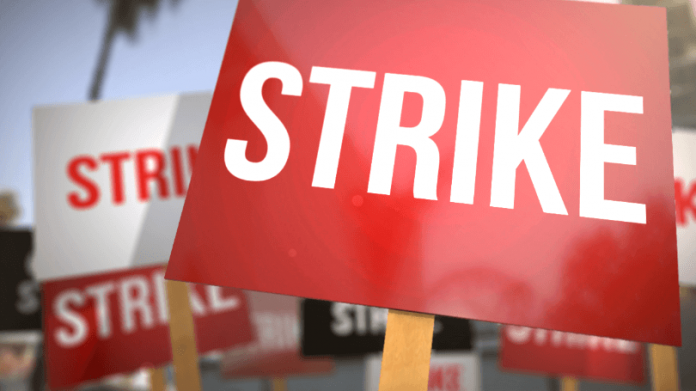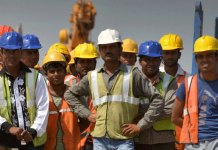This article is written by Smaranika Sen from Kolkata Police Law Institute. This article exhaustively deals with the legal rights of strikes and mass walkouts.
Table of Contents
Introduction
At times, when people are dissatisfied with any laws or rules, or working systems, they try to protest in the form of strikes and mass walkouts. Strikes and mass walkouts can be due to various reasons, and also there can be different forms of strikes. The world has witnessed several strikes and mass walkouts that had taken place due to various reasons. The question which arises here is whether strikes and mass walkouts are legal, or whether such rebel activities are an inherent right of the people? This article tries to clear every such ambiguity with the concept of strikes and mass walkouts.
Strikes and mass walkouts: An overview
Strikes are a form of protest against the competent authority to get their demands accepted. Generally, in a strike, a group of persons who are employees of any company or office stops working and do some act which is similar to a protest. The main purpose of a strike is to create pressure upon the authority so that they have to take any action regarding their demands. In other words, when a collective group of employees, together, stop working for any company, it can be referred to as a strike. Strike can arise due to several reasons. However, it has been observed that strikes mainly occur due to dissatisfaction with wages among the employees, or the working conditions i.e. excessive labour practices, etc. Now, strikes cannot be without any purpose or aim. There must be a set of demands that one group of persons wishes for and the authority in charge would acknowledge them or deny them.
Mass walkouts are also a form of protest. It is quite similar to strike. However, all strikes are not mass walkouts but all mass walkouts are a form of strike. Mass walkouts mean where a group of persons collectively form an organization and stop working in a manner of protest. Mass walkouts are especially seen in labour disputes. In labour disputes, a group of employees collectively leave the workplace showing disapproval regarding any norms or policies or working system or anything in the company or office or organization. It is of the belief that mass walkouts are silent and not so violent compared to other forms of strikes.
Often people interchangeably use the term strike and mass walkouts, but there are few differences between the terms. A mass walkout can occur spontaneously and need not require the involvement of all the workers of the company to be present, whereas in strikes a vote is done beforehand thereby informing the other co-workers as well as the competent authority about the strike. In the case of mass walkouts, the work is stopped for a certain number of days but in case of strike it has no end date, it goes on until their demands are accepted or negotiation is made where both the parties are satisfied.
General queries about strikes and mass walkouts
As a layman, we have various queries regarding strikes and mass walkouts. Let us try to solve certain queries.
-
The fear of being fired
The most common query is that can one get fired for going on a strike or mass walkout. We all at some point in our life, dissatisfied with something, have thought of protesting, but when such dissatisfaction comes with the workplace, we remain in the apprehension of getting fired. The answer is ‘No’. One cannot get fired just because they have engaged themselves in any strike or mass walkouts. However, this is also subject to certain exceptions. In cases where the strikes or mass walkouts are not lawful or the demands are beyond any capacity to be fulfilled by the authority or illegal strikes or walkouts have taken place, etc, in these circumstances, one might get fired. Thus one can always consult any lawyer to understand the scope of lawful strikes and walkouts. One should also have a piece of proper knowledge about the company policies regarding strikes and mass walkouts before engaging themselves in it.
-
A lawful strike and a mass walkout
Proper knowledge about what constitutes a lawful strike or mass walkout is important before one engages oneself in it. A consultation with a lawyer or an advocate before executing strike or mass walkouts is recommended, but all cannot afford a lawyer or an advocate. If we minutely observe the history of strikes or mass walkouts, then we can have an idea that most of the strikes or mass walkouts had taken place due to unfair wage distribution among the employees of a factory or a company. They often belong from the economically weaker section of the society, and also we should ourselves have a proper piece of knowledge about a lawful strike. A lawful strike depends on several factors; the most important being the purpose, timing, and conduct of the strikers. The most common categories of lawful strikes are unfair labour practices strike and economic strike. Unfair labour practice strike refers to employers blocking employees from unionizing and entering into collective bargaining and economic strikes include the issue of unequal wages distribution or lower wages, better working conditions, etc.
-
Legal rights
The persons who have been on strike and mass walkouts have to also face the consequences of it. It cannot be escaped. In certain cases, the competent authority may accept the demands of their employees and also do not take any strict actions against them. However, in certain cases, the competent authorities may accept their demands to some extent and simultaneously take actions against the employee for breaking certain policies of the company, or the competent authority might not accept any demands and take strict actions against all those who have been in strike and mass walkouts. In such times, one needs to know about their legal rights so that they can have fair justice. The economic strikers are usually retained as employees and are not discharged from their positions. However, the employer has the power to replace them, only if they have replaced the former employee with a permanent employee. But, in certain cases, if the former employee is not able to find any similar work, then he/she can be called again if there is an opening in the company. If any employee feels that they have retaliated, then he/she can consult with a lawyer and take action against the authority following the law.
-
Apprehension of being arrested
Another most crucial issue is whether one can get arrested while being on strike and mass walkouts. This fear is quite legitimate because there have been various instances where people on protests have been taken into custody. But there are certainly other issues that come out along with the apprehension of being arrested. The issue is does this means that anyone on the strike and mass walkouts can be arrested even if it is lawful? Or what rights do I have even if I am arrested for being on a strike or mass walkout? The first answer is not usually for lawful strikes and mass walkouts one cannot get arrested, but if someone in strikes and mass walkouts has committed any act which is illegal then he/she might get arrested. The latter answer is even if one has been arrested, then he/she has constitutional rights to protect themselves and also to access legal aid. One should also for safety, beforehand, should take suggestions from an advocate or lawyer.
The Indian law and strike and a mass walkout
Under Indian law, the right to strike is not expressly mentioned anywhere. However, the working class through its years of struggle has impliedly earned the right to strike. If we look back upon history, the working class does not have any other means to defend their rights to protect themselves from the unequal distribution of the economy or unfair labour practices. The strikes and mass walkouts were the only way possible to fight against such injustice. The authority would only come to negotiation because the money of the competent authority was directly dependent upon the working class. Thus the working class stopping their work would bring them huge losses.
In the case of Gujarat Steel tubes v. Itz Mazdoor Sabha (1979), the court held that the right to strike is an integral part of collective bargaining and the right to strike is supported and recognized by social and industrial jurisprudence.
It is of the belief that the right to strike is not an absolute right rather it comes along with the right to form a union or association by virtue of Article 19(1)(c). Like all other fundamental rights, the right to strike is also subject to certain reasonable restrictions, and the State on observing certain situations may impose reasonable restrictions on the right to strike. In the case of All India Bank Employee Association v. I.T (1961). The Supreme Court held that the right to strike is subject to be previewed under industrial legislation. The validity of such legislation would take place by performing a test but such a test would not be done as mentioned in Article 19(4).
The Industrial Disputes Act, 1947 defines the term strike. As per the Act, a strike means a group of people who are employed in an industry ending the body of work or refusing to work under a common understanding of the persons who are working as an employee there or accepting employment. Under this Act, the right to strike is recognized through Section 22, Section 23, and Section 24. Section 24 further differentiates between illegal and legal strikes. The Act through Section 22 sets certain prohibitions on the right to strike. It states that the persons in the public utility services without giving prior notice to the employer within six weeks before striking, or within fourteen days of such notice or before the expiry date of the strike mentioned in the notice or during the pendency of any conciliation proceedings or seven days after the end of such proceedings must not go on a strike. The National Labor Relations Act, 1935 also recognizes the right to strike. However, a full reading of the Act implies that though this Act guarantees the right to strike but also puts various limitations in the execution of such rights.
India is a signatory to the International Covenant of Economic, Social, and Cultural Rights also known as ICESCR. This Convention through its provisions recognizes the right to strike. It states that the right to strike should be exercised in accordance with the laws of that particular country. India being a member of that Convention, is also bound by that law.
The International Labor Organisation also recognizes the right to strike. India is one of the founding members of ILO, thereby India has to follow the rules of ILO as well.
Major Incidents
In 2012, a popular industry Maruti Suzuki faced a huge strike. A worker was suspended because of his misconduct with the shop floor supervisor, this led to a huge clash between the workers and managerial staff. The strike turned out to be violent including the burning of the administration wing and the death of a general manager due to injuries.
In January 2019, a huge strike took place. The main aim of this strike was to take the labourer’s consultation while reforming labour laws including the Trade Unions Act, 1926 and also to stop pro-employer labour law amendments. They also demanded ratification of ILO Convention 87 and Convention 98.
Lately, we have all heard about the farmer’s protest. Mass walkouts took place signifying protest. This protest is considered one of the most challenging protests in the history of the current ruling government. The strike is against the new agricultural laws.
In November 2020, over 250 million workers together took part in a general strike. The strike was in condemnation of the arrest of the farmers and labourers all over the country. Both public and private sector employees, trade unions, farmers came together in this strike. All India Kisan Sangarsh Coordination Committee also extended their support to this strike.
Conclusion
Strikes and mass walkouts are important weapons especially in the hands of labour. It is the most powerful weapon to fight for their rights. Though the right to strike in Indian law is not absolute, yet through various statutes and provisions, it is indirectly guaranteed. This weapon should be used judiciously otherwise this weapon may turn out to be dangerous. The strikers must always remember that their demands must be reasonable and not any unusual enrichment.
References
- https://www.rocketlawyer.com/blog/strikes-and-mass-walkouts-know-your-legal-rights-927395
- https://www.mondaq.com/india/workforce-management/24797/right-to-strike-under-industrial-dispute-act-1947
LawSikho has created a telegram group for exchanging legal knowledge, referrals and various opportunities. You can click on this link and join:
 Serato DJ Crack 2025Serato DJ PRO Crack
Serato DJ Crack 2025Serato DJ PRO Crack










 Allow notifications
Allow notifications


